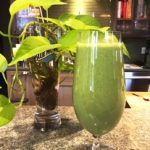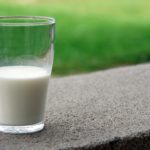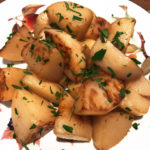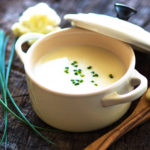
Studies suggest that regular consumption of vegetables from the cruciferous family, which include cauliflower, broccoli, and cabbage, may reduce the risk of several types of cancer. A major prospective dietary study conducted in Europe found a reduced incidence of a type of lung cancer common in male smokers and reduced cancer of the upper digestive tract among people who regularly (every day) ate cauliflower and cabbage. A second U.S. study showed a lower incidence of a type of lymph node cancer with higher vegetable consumption. Cruciferous vegetables contain beneficial compounds called glucosinolates that are broken down into cancer-fighting byproducts when digested.
[gdlr_styled_box content_color=”#ffffff” background_color=”#3d6817″ corner_color=”#9ada55 ” ]Silky Cauliflower Soup
Active Time, 15 minutes, Total Time, 50 minutes
1 stick unsalted grass fed butter or coconut oil
1 onion, coarsely chopped
1 shallot, coarsely chopped 2 garlic cloves, sliced
1, 2 lb. head of cauliflower, cut into 2 inch pieces
4 sprigs of fresh thyme
1 bay leaf
1 quart low-sodium chicken or vegetable stock
4 cup filtered water
Salt and freshly ground black pepper to taste
Pinch of freshly grated nutmeg
In a soup pot, melt butter or coconut oil
Add onion, shallot and garlic and cook over moderate low heat, stirring occasionally until softened, about 5 minutes
Add the cauliflower, thyme and bay leaf and cook, stirring occasionally, until the cauliflower is barely cooked, about 5 minutes more.
Add broth and water and simmer over moderately low heat until the cauliflower is softened and falling apart, about 30 minutes.
Discard thyme sprigs and bay leaf and transfer the soup to a high-speed blender.
Blend the soup until very smooth. Season with salt and freshly ground black pepper to taste, and sprinkle with desired amount of grated nutmeg.[/gdlr_styled_box]

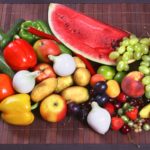
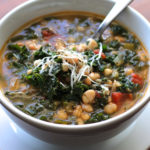
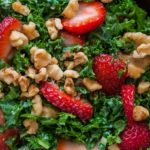
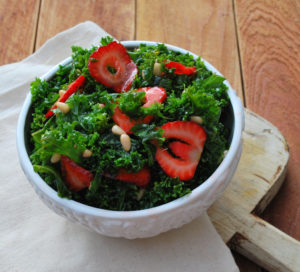 Strawberries and Kale
Strawberries and Kale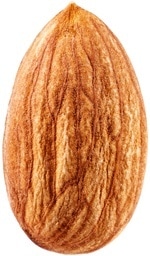 Almonds are rich in Biotin, a B-complex vitamin that helps prevent hair loss and keeps hair shiny and strong. Balancing intake of biotin with foods hight in pantothenic acid, (Vitamin B5) is thought to be especially helpful to hair, skin and nails. Other foods that contain biotin are mushrooms, avocado, sweet potato, lentils and chicken.
Almonds are rich in Biotin, a B-complex vitamin that helps prevent hair loss and keeps hair shiny and strong. Balancing intake of biotin with foods hight in pantothenic acid, (Vitamin B5) is thought to be especially helpful to hair, skin and nails. Other foods that contain biotin are mushrooms, avocado, sweet potato, lentils and chicken.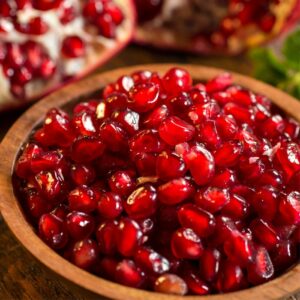 Pomegranates are rich in polyphenol antioxidants including ellagic acid, which acts as a free radical scavenger to ward off sun damage and slow skin aging, and it may help prevent skin cancer. This fruit also helps reduce inflammation an speed wound healing. Other good sources of ellagic acid are strawberries, raspberries, blackberries, walnuts and pecans.
Pomegranates are rich in polyphenol antioxidants including ellagic acid, which acts as a free radical scavenger to ward off sun damage and slow skin aging, and it may help prevent skin cancer. This fruit also helps reduce inflammation an speed wound healing. Other good sources of ellagic acid are strawberries, raspberries, blackberries, walnuts and pecans.